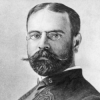John Philip Sousa

John Philip Sousa
John Philip Sousazɐ]; November 6, 1854 – March 6, 1932) was an American composer and conductor of the late Romantic era, known primarily for American military and patriotic marches. Because of his mastery of march composition, he is known as "The March King", or the "American March King" due to his British counterpart Kenneth J. Alford also being known by the former nickname. Among his best-known marches are "The Stars and Stripes Forever", "Semper Fidelis", "The Liberty Bell", "The Thunderer" and...
NationalityAmerican
ProfessionMusician
Date of Birth6 November 1854
CountryUnited States of America
I am happy now, to recall that I was no only his son but his companion, and whenever there was a hunting expedition or any other pleasure, I was always with him.
The movements which I make I cannot possibly repress because, at the time, I am actually the idea I am interpreting, and naturally I picture my players and auditors as in accord with me. I know, of course, that my mannerisms have been widely discussed.
I think that the quality of all bands is steadily improving and it is a pleasant thought to me that perhaps the efforts of Sousa's Band have quickened that interest and improved that quality.
The average music-lover hears only the production under prevailing conditions.
To the average mind popular music would mean compositions vulgarly conceived and commonplace in their treatment. That is absolutely false.
Governmental aid is a drawback rather than an assistance, as, although it may facilitate in the routine of artistic production, it is an impediment to the development of true artistic genius.
I had found English audiences highly satisfactory. They are the best listeners in the world. Perhaps the music-lovers of some of our larger cities equal the English, but I do not believe they can be surpassed in that respect.
There is one thing that freezes a musician more than the deadliest physical cold, and that is the spiritual chill of an unresponsive audience!
The office of President is a great one; to every true American it seems the greatest on earth. And to me, as I was engaged in weaving a background of music for the pageantry of it, there came a deeper realization of the effect of that office on the man.
No nation as young as America can be expected to become immediately a power in the arts.
There is much modern music that is better adapted to a wind combination than to a string, although for obvious reasons originally scored for an orchestra. If in such cases the interpretation is equal to the composition the balance of a wind combination is more satisfying.
Is it not the business of the conductor to convey to the public in its dramatic form the central idea of a composition; and how can he convey that idea successfully if he does not enter heart and soul into the life of the music and the tale it unfolds?
My success is not due to any personal superiority over other people.
Composers are the only people who can hear good music above bad sounds.